HOW TO FIND HCF OF TWO NUMBERS IN DECIMAL
Subscribe to our ▶️ YouTube channel 🔴 for the latest videos, updates, and tips.
The largest number which can divide the given two or more numbers evenly is called their highest common factor (HCF).
In this section, we will learn, how to find highest common factor of two or more numbers in decimal.
The following steps would be useful to find HCF of two numbers in decimal.
Step 1 :
Convert all the given decimal numbers into integers using multiplication of 10 or 100 or 1000.......
For example, if you want to find HCF of 0.7 and 0.63, find the number in which you have more number of digits after the decimal. In 0.63, you have more number of digits after the decimal point. That is, two digits.
So, multiply both the numbers 0.7 and 0.63 by 100 to get rid of the decimal point and make them to be integers.
Step 2 :
After multiplication of 10 or 100 or 1000......, find the HCF of the integers you get in step 1.
Step 3 :
Divide the HCF you get in step 2 by 10 or 100 or 1000.....by which you multiplied the given decimal numbers in step 1.
Example 1 :
Find the highest common factor of 0.90 and 0.30.
Solution :
In the given two numbers 0.90 and 0.30, we find equal number of digits after the decimal point in both the numbers. That is, two digits.
To get rid of the decimal point, we have to multiply each number by 100.
0.90 ⋅ 100 = 90
0.30 ⋅ 100 = 30
Find the HCF of 90 and 30.
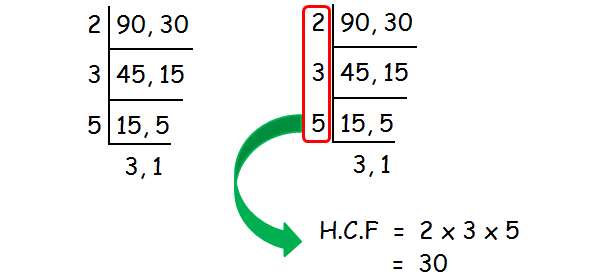
HCF of 90 and 30 is 30.
Divide the HCF by 100.
30/100 = 0.3
So, the highest common factor of 0.90 and 0.30 is 0.3.
Example 2 :
Find the highest common factor of 0.36 and 0.27.
Solution :
In the given two numbers 0.36 and 0.27, we find equal number of digits after the decimal point in both the numbers. That is, two digits.
To get rid of the decimal point, we have to multiply each number by 100.
0.36 ⋅ 100 = 36
0.27 ⋅ 100 = 27
Find the HCF of 36 and 27.
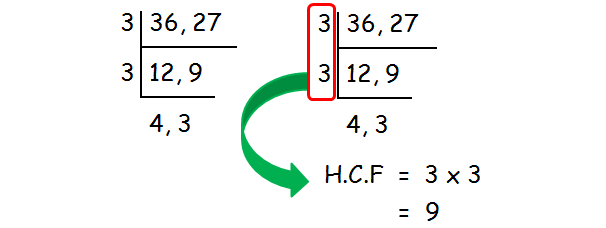
HCF of 36 and 27 = 9.
Divide the HCF by 100.
9/100 = 0.09
So, the highest common factor of 0.36 and 0.27 is 0.09.
Example 3 :
Find the highest common factor of 0.75 and 0.45.
Solution :
In the given two numbers 0.75 and 0.45, we find equal number of digits after the decimal point in both the numbers. That is, two digits.
To get rid of the decimal point, we have to multiply each number by 100.
0.75 ⋅ 100 = 75
0.45 ⋅ 100 = 45
Find the HCF of 75 and 45.
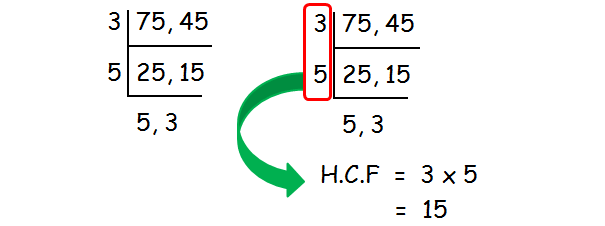
HCF of 75 and 45 is 15.
Divide the HCF by 100.
15/100 = 0.15
So, the highest common factor of 0.75 and 0.45 is 0.15.
Example 4 :
Find the highest common factor of 0.36 and 0.72.
Solution :
In the given two numbers 0.36 and 0.72, we find equal number of digits after the decimal point in both the numbers. That is, two digits.
To get rid of the decimal point, we have to multiply each number by 100.
0.36 ⋅ 100 = 36
0.72 ⋅ 100 = 72
Find the HCF of 36 and 72.
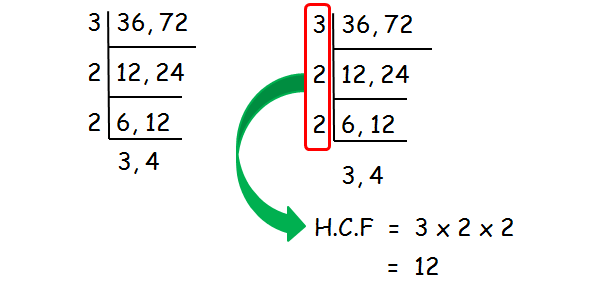
HCF of 36 and 72 is 12.
Divide the HCF by 100.
12/100 = 0.12
So, the highest common factor of 0.36 and 0.72 is 0.12.
Example 5 :
Find the highest common factor of 0.72 and 0.63.
Solution :
In the given two numbers 0.72 and 0.63, we find equal number of digits after the decimal point in both the numbers. That is, two digits.
To get rid of the decimal point, we have to multiply each number by 100.
0.72 ⋅ 100 = 72
0.63 ⋅ 100 = 63
Find the HCF of 72 and 63.
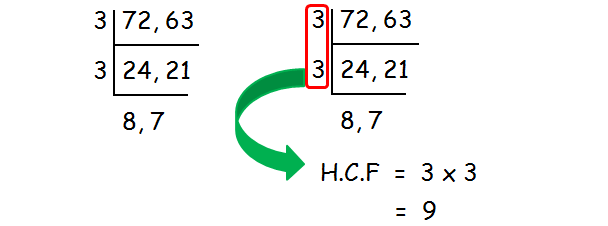
HCF of 72 and 63 is 9.
Divide the HCF by 100.
9/100 = 0.09
So, the highest common factor of 0.36 and 0.72 is 0.09.
Example 6 :
Find the greatest number which when divides 259 and 465 leaves remainders 4 and 6 respectively.
Solution :
To find the greatest number that divides 259 and 465 and leaving the remainders 4 and 6.
259 - 4 = 255
465 - 6 = 459
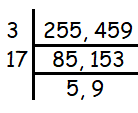
HCF = 3 x 17
= 51
So, the required number which when divides 259 and 465 leaves remainders 4 and 6 respectively is 51.
Example 7 :
Find the greatest number, which when divides 41, 71 and 91, leaves the same remainder in each case.
Solution :
Take the difference between all the three pairs of numbers and their HCF will be the answer i.e. 91 – 41 = 50, 71 – 41 = 30 and 91 – 71 = 20. Now, the HCF of 50, 30 and 20 is 10.
Sometimes in such questions, the common remainder can also be asked. You can divide any of the numbers given by HCF (41 ¸ 10) and find the remainder to be equal to 1.
Subscribe to our ▶️ YouTube channel 🔴 for the latest videos, updates, and tips.
Kindly mail your feedback to v4formath@gmail.com
We always appreciate your feedback.
About Us | Contact Us | Privacy Policy
©All rights reserved. onlinemath4all.com

Recent Articles
-
The 15 Hardest SAT Math Questions Ever
Feb 03, 26 10:47 AM
The 15 Hardest SAT Math Questions Ever -
25 of the Hardest SAT Math Questions
Feb 03, 26 10:30 AM
25 of the Hardest SAT Math Questions -
SAT Math Practice Problems with Answers
Feb 03, 26 06:24 AM
SAT Math Practice Problems with Answers


